There’s plenty of choice when it comes to buying camping food; there’s dehydrated and boil-in-the-bag food, as well as tinned meals to consider. Of course, they're not all equal in taste, convenience and nutritional value, so we’ve tested seven leading brands to find the best camping food out there.
6 lightweight camping meals reviewed
*Prices, calories and weights correct at time of writing
These meal-in-a-bag options make cooking extremely easy. Just add water, or boil-in-the-bag. Most can be eaten straight from the bag, so there's no washing up.
Real Turmat
- Buy now from Amazon (£7.00 ), Base Camp Food (£7.00 )
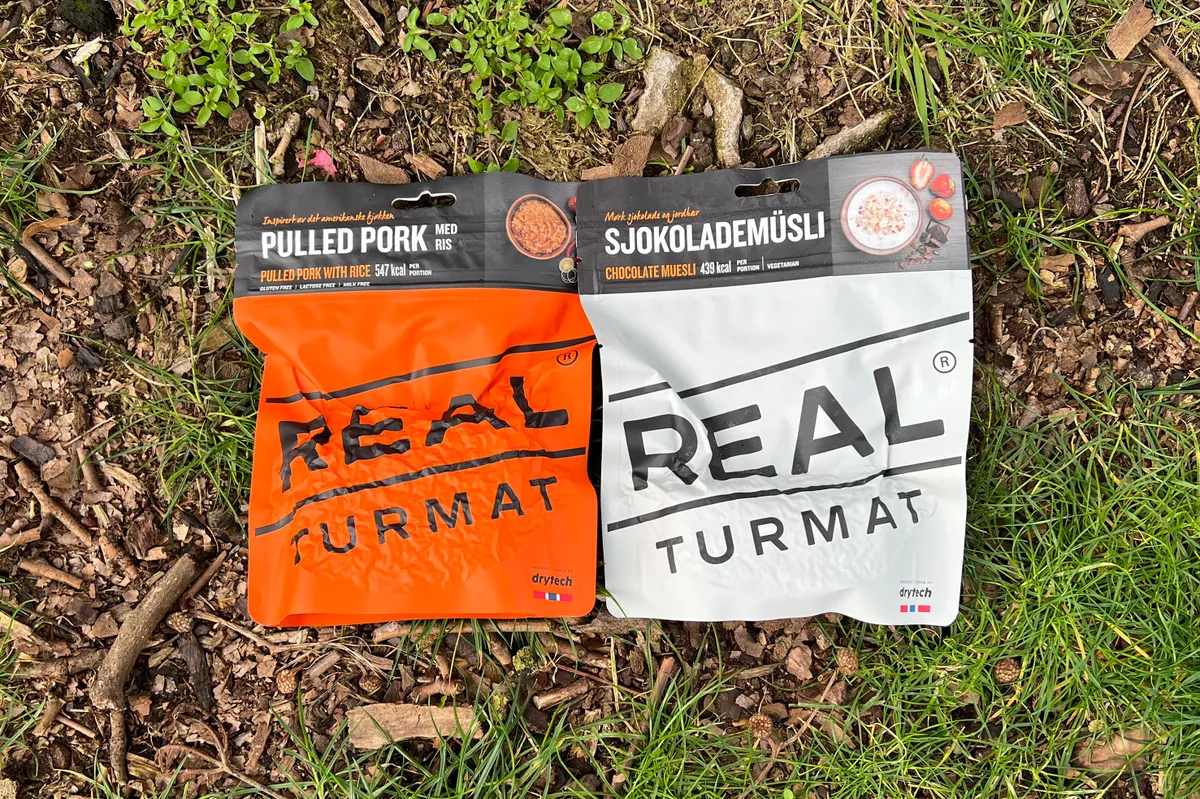
- Type: Dehydrated
- Price: £6.99-£12.99
- Weight: 71-203g
- Calories: 246-706 kcal
- Shelf life: 3-7 years
Pros: tasty, useful open tab and fill line, some have long shelf life; lightweight food for backpackers or anyone carrying their own grub
Cons: harder to pack as they’re rigid, more expensive than others
Unlike most other dehydrated camping meals, Real Turmat pouches are vacuum packed, so they’re more compact – but also rock solid and won’t slide into your backpack as easily as slimline pouches. They’re also more expensive than others, but their impressive taste and texture could make them worth the cost. These are a great option if you’re willing to spend a little more on camping food.
Real Turmat’s selection includes standard dishes with around 600 kcal; Field pouches, which are the same meals with 700 kcal; and Arctic Field Rations with up to 1,519 kcal. Across these ranges, the makers say they prioritise high-quality ingredients and slowly freeze-dry them to retain nutrients, texture and flavour. We were impressed to see the low levels of saturated fats in the meals we tested.
A great option if you’re willing to spend a little more on camping food.
It’s fair to say the hot chocolate muesli and the pulled pork meals we tried were probably our favourites across all the brands on test. The ‘Sjokolademüsli’ was deliciously flavoursome and comforting, and we loved the melting chocolate chunks as an alternative to the many fruity porridge meals you can buy. Plus, it was ready in just three minutes.
As for the pulled pork, it looked and tasted just like a normal meal. One tester described it as “rich, tomatoey and wholesome, like a feelgood stew”, and another: “my favourite of the lot”. The flavour was great, with a strong taste of oregano, while the rice was well-cooked and filling. In short, it was extremely easy to eat and many of us went back for seconds.
TentMeals
- Buy now from Amazon (£5.95 )
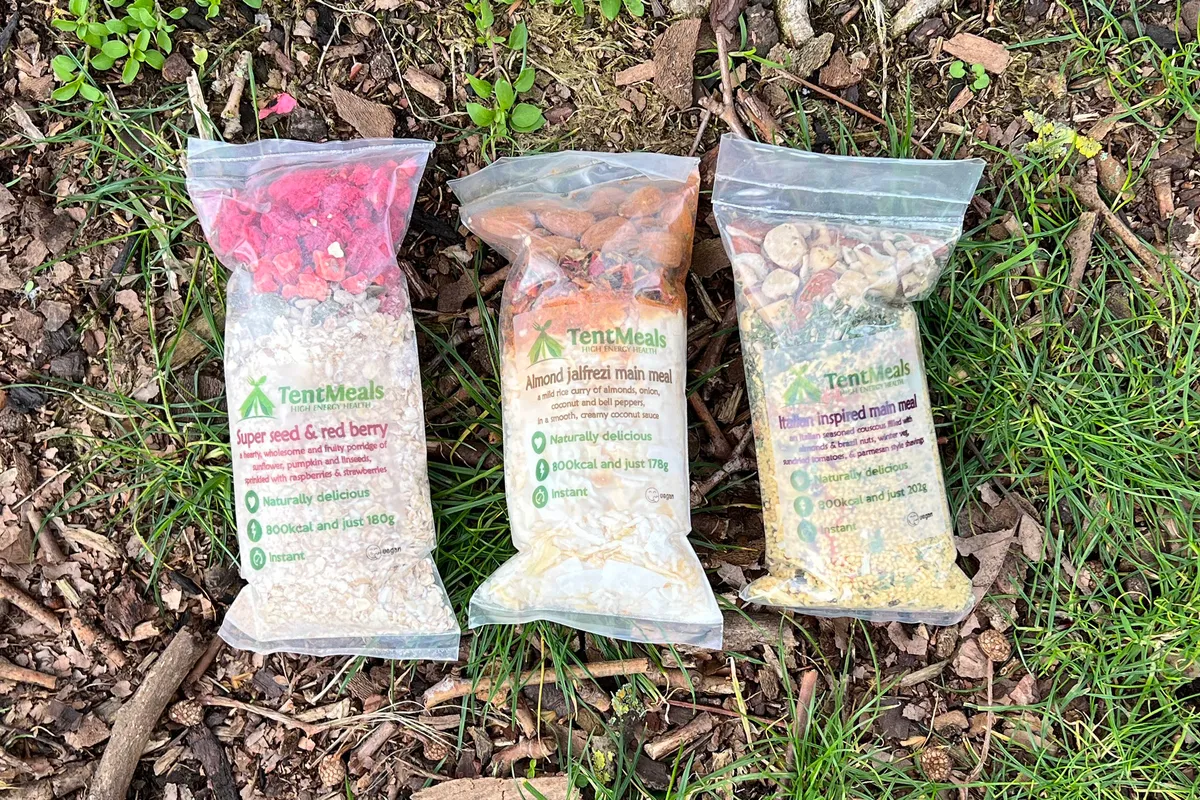
- Type: Dehydrated
- Price: £4.80-£6.50
- Weight: 107-203g
- Calories: 500-800 kcal
- Shelf life: 1 year
Pros: wholesome ingredients, looks like real food, meals come in 500 kcal and 800 kcal sizes
Cons: not slimline (about the volume of a soda can)
TentMeals’ clear packaging and beautifully presented ingredients put the brand ahead of others when it comes to looks. As a result, we expected these pouches to be among the most expensive on test, but their price tag isn’t as big as it could be for such attractive presentation.
The brand starts its meals with a base of rice, couscous or oats for complex carbs, and switches oil for nuts, seeds and coconut. We noticed high levels of protein in our test choices too – 29g in the Italian-inspired main meal.
The company uses lots of organic ingredients and no preservatives, colourants or nasty additives. Plus, most meals are veggie- and vegan-friendly.
Starting with the Italian-inspired main meal, some testers were disappointed with the flavour, likening it to powdered veg stock or old-fashioned vegan food. The strong sundried tomato taste lingers in the mouth for a while after eating and the whole nuts add a slightly strange element to the texture – although they are a nutritious and filling addition. We liked the use of couscous, which always cooks quickly.
Flavoursome, delicious and more-ish.
The super seed and red berry porridge proved popular among the team. With a slight underbase of salt, it’s not as sweet as other oaty meals we tried, and we loved the cinnamon, zingy freeze-dried raspberries and seeds for texture. “Flavoursome, delicious and more-ish”, according to one of our testing panel.
While you could probably assemble the ingredients for a fraction of the price of a TentMeals pouch, you’re paying for the convenience of having the exact ingredients ready and waiting in a neat parcel.
Both of these meals come in easy-to-rip plastic packaging and took just seven minutes to prepare.
Expedition Foods
- Buy now from Amazon (£7.99 ), Decathlon (£8.49 )
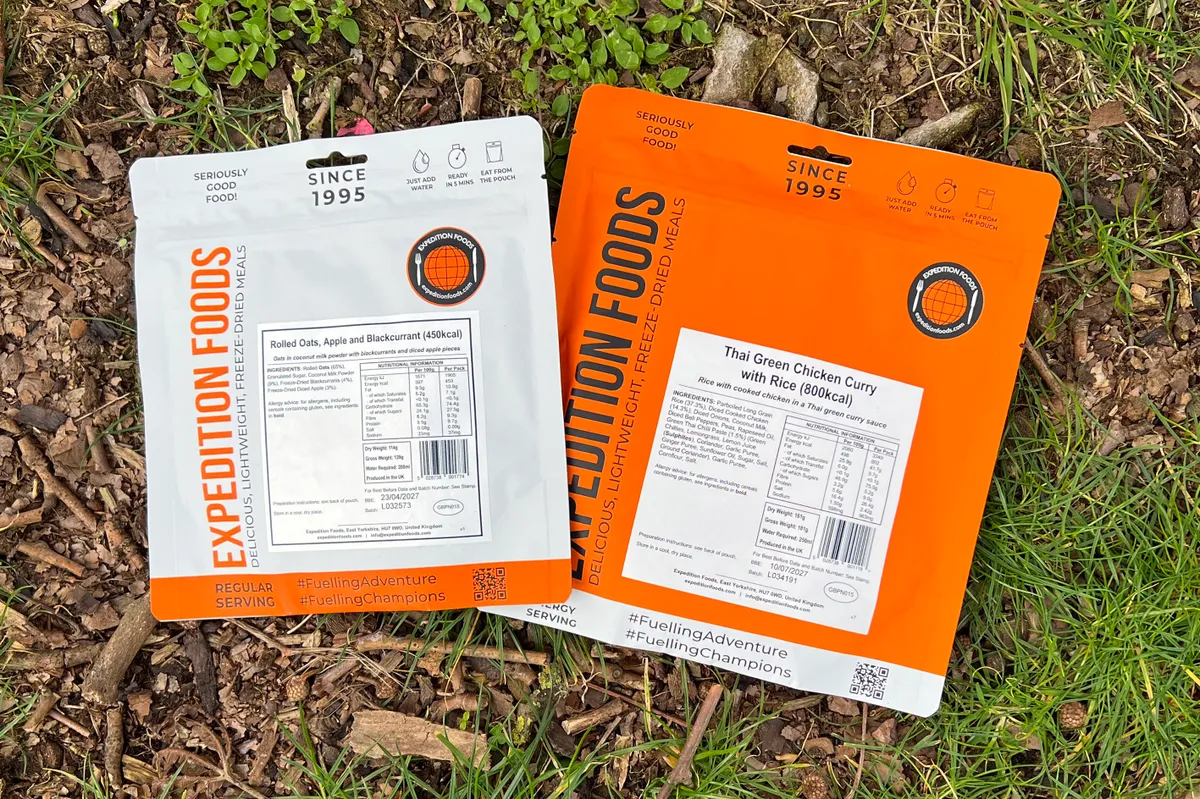
- Type: Dehydrated
- Price: £7.99-£13.99
- Weight: 91-248g
- Calories: 450-800 kcal
- Shelf life: up to 5 years
Pros: large portions available (Thai green chicken curry has 800 kcal and 26g of protein)
Cons: relatively expensive, confusing packaging
Expedition Foods’ range of pouches includes 28 different main meals and four desserts, so there’s plenty of choice.
Although the preparation process is quick and simple: add hot water to the pouch, stir it and wait for five minutes – we struggled to understand the confusing packaging and work out how much water to add.
The breakfast oats weren’t as tasty as other porridge and muesli-style camping meals on our list, but still ranked highly for us. We liked how the sharp apple offset the sweetness of the porridge.
On the other hand, the protein-rich Thai green chicken curry got mixed responses from our team. While some testers liked the look of the meal with its large, identifiable ingredients like a ‘real’ dinner, others found it fairly unappetising. Some of the chicken chunks were still dry and chewy, even after extra time to soften, but the spicy and salty flavour wasn’t too overpowering.
If you’re camping with someone else, try the brand’s range of double-serving meals, each with 1,000 kcal.
Wayfayrer
- Buy now from Decathlon (£4.95 )
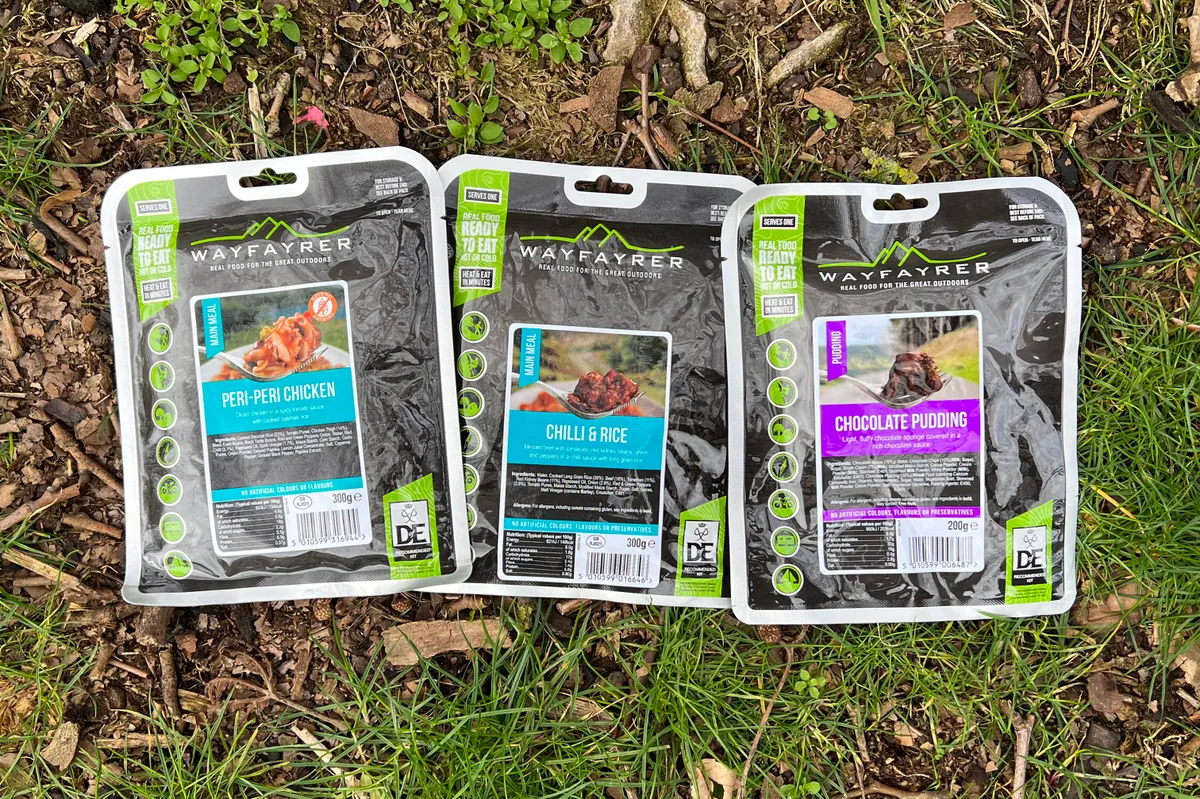
- Type: Reheat or boil in the bag
- Price: From £4.50
- Weight: 200-300g
- Calories: 297-588 kcal
- Shelf life: 3.5 years
Pros: don’t need to add water
Cons: heavier than other pouches
While most of the camping meals we tested were dehydrated, Wayfayrer’s portions are ready to eat hot or cold. For best results, either warm them in a pan or boil them in their packaging for 7-8 minutes.
At 200-300g per pouch, they are slightly heavier than dehydrated options.
We were pleased to discover vegetarian, vegan and gluten-free options in Wayfayrer’s camping meal selection, which currently includes three breakfasts, eight mains and two desserts.
The ones we tested were lower in saturated fat than meals from other brands, and scored fairly highly among the team. Wayfayrer’s Peri Peri chicken contained tasty beans and a good mix of ingredients in a spicy, tomato-based sauce. We’d recommend topping with cheese or chilli sauce if you have some.
We were also drawn to the chocolate pudding. The flavour was rich, if a bit artificial, and we loved the thick, custard-like sauce. The sponge itself was dense and resembled a brownie. We reckon this would be a comforting treat after a long day of hiking.
Firepot
- Buy now from Millets (£6.75 )

- Type: Dehydrated
- Price: £6.99-£8.49
- Weight: 105-135g
- Calories: 435-940 kcal
- Shelf life: 1 year (compostable pouches) - 3 years (yellow pouches)
Pros: brown pouches are compostable, yellow pouches have resealable tab
Cons: take 15 mins to prepare, need stove pot with ml measurements
Firepot is probably one of the most well-known camping food brands out there, so we decided to start our food test with its porcini mushroom risotto and green gumbo.
The brand’s meals come in either brown compostable packaging, which breaks down in a year, or waterproof yellow pouches, which you can fill with water to eat straight from the packet.
The meals we tested were vegan-friendly and free from lactose, palm oil and artificial additives. They also had low levels of saturated fats.
A wholesome meal with a homemade look.
Of all the camping food we tested, these portions took the longest to prepare, as you need to leave them to rehydrate for 15 minutes, but the process was pretty simple: just add the water, stir and wait.
When it came to trying the meals, the risotto had a strong natural flavour and the mushrooms were pleasantly firm in texture. You might want to add a sprinkling of cheese on top if you have some with you.
As for the green gumbo, although the yellow pouch was quite tricky to tear neatly, we liked its resealable tab. There are also useful markings to indicate the amount of water to add, but once rehydrated, the meal bore an unwelcome resemblance to packet stuffing. and could’ve done with more water. The flavour was spicy and had a slightly bitter kale taste, and the rice was still quite firm. Overall, a wholesome meal with a homemade look.
One of our testers was keen to point out that other Firepot flavours are far tastier, so perhaps consider trying them yourself.
For long treks or group trips, Firepot also sells multi-portion bags and large meals with 750-940 kcal.
Adventure Food
- Buy now from Cotswold Outdoor (£5.00 )
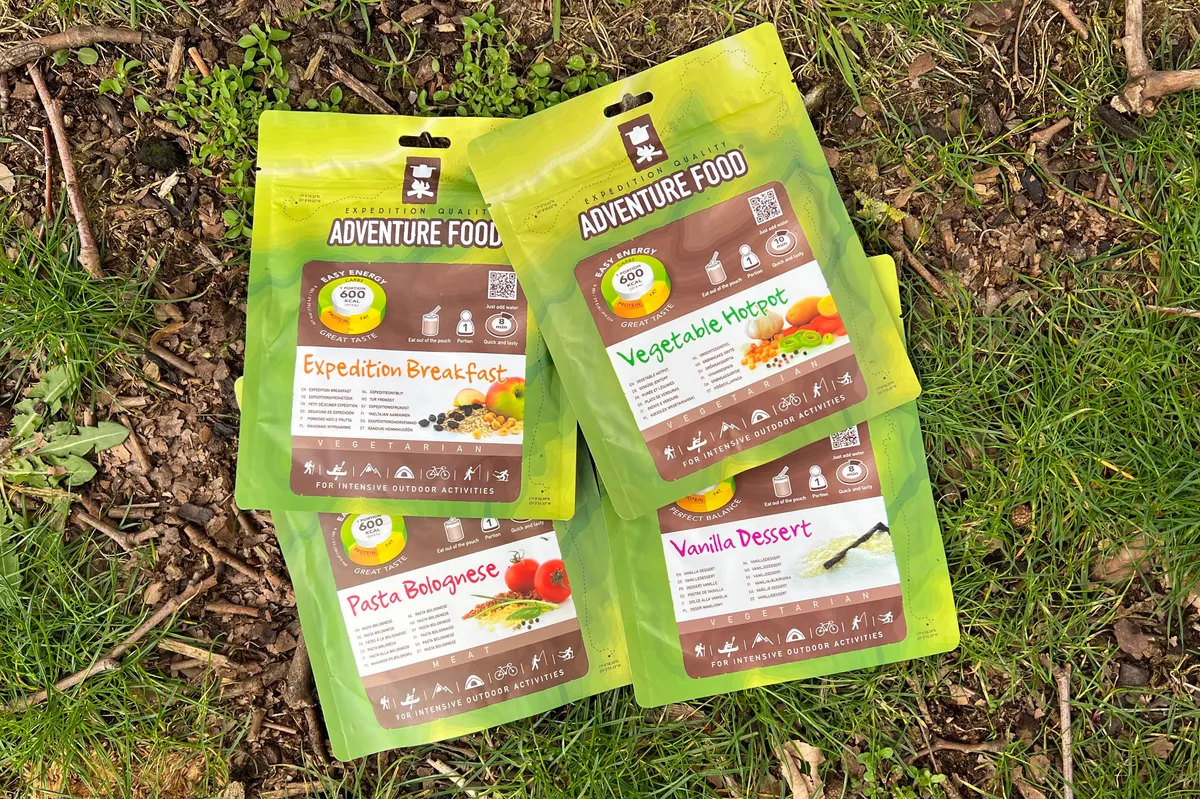
- Type: Dehydrated
- Price: From £5.40
- Weight: 67-156g
- Calories: 300-600 kcal
- Shelf life: 4 years
Pros: low saturated fat, resealable pouch
Cons: high sugar and salt
Adventure Food has a good variety of camping meals, including eight meaty options, eight vegetarian choices, three desserts and two breakfasts. The ones we tested were ready in eight minutes and you could eat them straight from the pouch.
However, these aren’t the healthiest camping meals you can find. Although our test dishes were low in saturated fat, the pasta bolognese had more than 18g of sugar. The dessert had almost 42g of sugar - much more than other puddings and breakfasts we tried.
The pasta also contained and 4.7g of salt, more than three quarters the RDA for an adult. On the other hand, you're likely to have lost significant amount of salt through perspiration during a day's hike, so somewhat salty foods are not all bad a the end of a strenuous day's activity. Anyway, it's not as if you're going to eat food like this every day.
Neither of the meals we sampled scored very highly for us on flavour. The bolognese was extremely herby and tasted a lot like tinned veg soup. After eight minutes' rehydrating, the meal still had dry and chewy bits, but the pasta held its shape well.
The vanilla dessert got mixed results. While some thought the strong, sweet flavour would be comforting after a gruelling hike, others found the texture lumpy and floury. It’s designed to be made with cold water, so the mixture clumps quickly, rather than dissolving.
Still hungry?
Some more easy ways to fill up when you're camping...
Mug Shot noodles
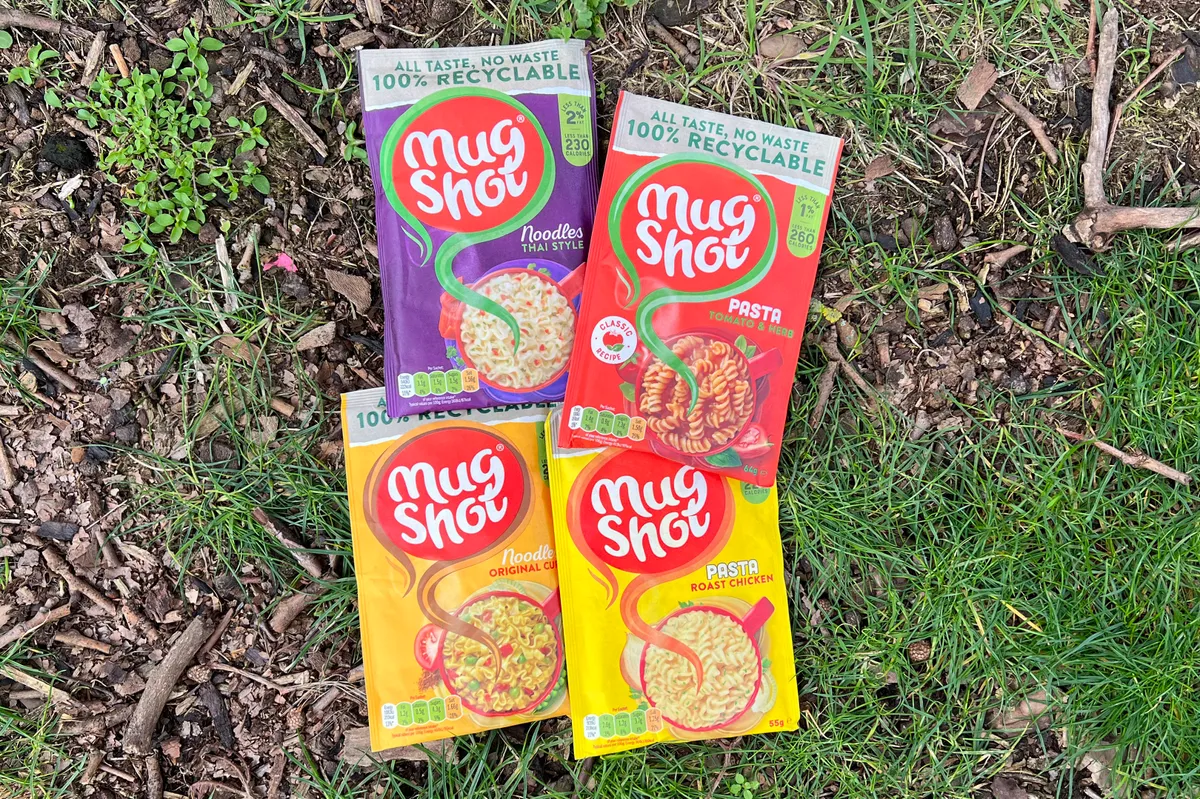
- Type: Dehydrated
- Price: From 80p
- Weight: 45-68g
- Calories: 180-290 kcal
- Shelf life: 1-2 years
Pros: lightweight at 55g and less bulky than Pot Noodles, recyclable packaging, cheap
Cons: not particularly nutritious, very low protein
While instant noodles aren’t the most nutritious camping meals on the market, they are lightweight, cheap and make for an immediate hot meal, helping you build your energy levels for the next day with some value carbohydrates.
The noodles we tested contained very little protein (6g in the Thai-style noodles), but also low saturated fat (just 0.9g in the tomato pasta). It's probably best to think of them as a partial meal that you will want to add other components. They certainly make a simple and easy way to replace some lost calories after an exhausting day, whether you're been on the trail, or surfing in a cold sea.
They took just five minutes to rehydrate in hot water, and earned extra points for us thanks to their 100% recyclable paper packaging.
Sadly, the two meals we tried were fairly disappointing when it came to the taste review. Some testers enjoyed the Thai-style noodles’ creamy texture and Thai green curry flavour, but others found it sickly and cloying.
None of us enjoyed the tomato pasta, which had a thin, fairly bland sauce and sugary, artificial taste. It seemed half-cooked and had quite an unpleasant texture – this won't be joining us on our next trip.
But we are not giving up on instant noodles. We'll go in search of more palatable options for you.
Hunger Breaks All Day Breakfast
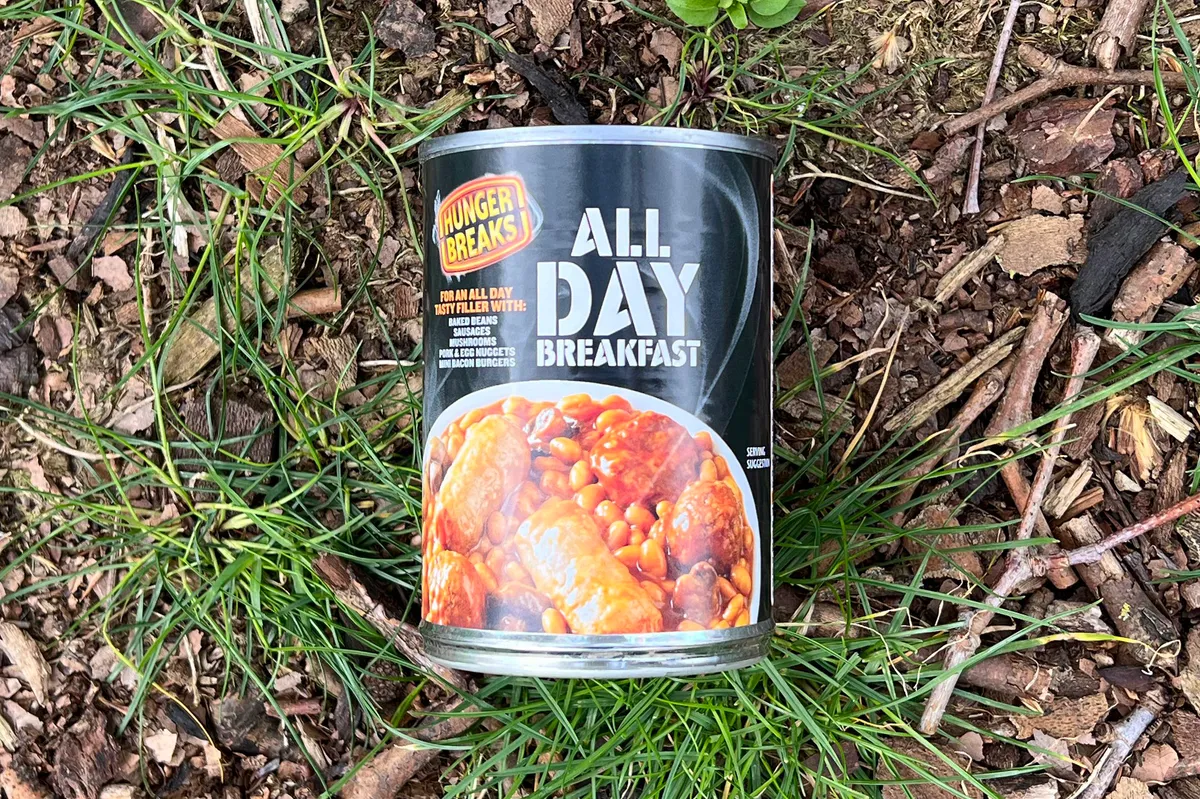
- Type: Reheat in a pan
- Price: From 50p
- Weight: 395g
- Calories: 442 kcal
- Shelf life: 2 years
Pros: cheap, recyclable tin
Cons: high sugar, salt and saturated fat, heavy, need a tin opener
If you’re driving to your campsite but don’t have a fridge, you could take a tinned meal like this one. Some of the team felt it was too heavy for hikers, and not tasty or nutritious enough to compare to other tinned foods, but it’s certainly a filling meal.
There’s no getting away from the fact that it looks fairly unappealing and contains a lot of processed food. The sausages, bacon burgers and egg nuggets were fairly indistinguishable from each other and seemed to disintegrate in the mouth. Anyone looking forward to the nuggets might be disappointed by the tiny amount of egg in the middle, and the peppery taste throughout.
There is a good amount of protein in the tin, at 20g, but you’ll also be consuming 13g of sugar.
Overall, although it’s not a meal we’d all rush to buy, the testers agreed the soft beans were similar to ones you’d find among leading brands, and it’s not bad for the type of meal it is. It does what it says on the tin! One dissenting tester pointed out that after a chilly night in a tent, a piping hot bowl of beans and bangers might be an easy and satisfying way to fuel up for the day.
Heat it up for five minutes until it bubbles.
How we tested
- We selected test products across various categories based on product reviews
- We compared their price, weight, size and nutritional value
- We tasted them to see how easy and pleasant they were to eat
Other great camping foods
These options also make fantastic camping food:
Dorset Cereals
Muesli makes an excellent camping food, whether for breakfast or a snack. If fresh milk is in short supply, bear in mind that Swiss-style muesli already contains dried milk – so just add water. If that sounds a bit thin, you can always mix some extra dried milk through your muesli before you go.
If you are looking for a high-quality muesli, the muesli-munchers on our team of reviewers rated Dorset Cereals highly. The Poole-based breakfast maker sells a range of delicious, high-quality muesli. Go for one of the brand’s standard blends, like ‘fruity’ or ‘nutty’, or choose an ‘ultimate’ pack for extra nutritious ingredients. We recommend starting with the ‘toasty toasted spelt flakes muesli’.
Freeze-dried raspberries
Fresh fruits can get bruised and perish on long camping trips, but freeze-dried options keep much better. They will transform a bowl of porridge or muesli with a surprisingly fresh and zingy flavour, and they are full of vitamins and antioxidants.
Naked Ultimate Noodles
If you’ve got space to store bulky meals, why not upgrade from sachet noodles to Naked’s Ultimate range? There’s a wide variety of different flavours available, including a ‘free from’ range, which excludes gluten and dairy. The price may be high, but camping is one of the most affordable ways to enjoy the countryside – so maybe you deserve a treat!
Canned meals
Anyone driving to their campsite might want to take along some tinned meals. Princes is a great brand to browse, as it sells a bundle, including chicken curry, beef stew and tomato meatballs. Marks and Spencer is also well known for its canned meals.
Flapjack / Soreen Malt Lunchbox Loaves
For snacks and desserts, try oaty flapjack or Soreen’s range of fruity malt loaves. They’re a filling, nutritious energy source, they won't melt in the heat (unlike chocolate), and they’ll keep for days.
What are easy foods to take camping?
If you’re looking for full meals, the best option depends on how you’re travelling to your campsite.
Camping by car
If you’re driving to your campsite, you can take heavy items like tinned food. You can find meals like curry and ratatouille in the supermarket, as well as breakfasts (we’ve tested a Full English-style creation below).
Depending on your preference and budget, you could opt for fairly basic tins or go upmarket with higher-quality meals from luxury supermarkets.
Camping on foot or by bike
If you’re carrying all your food on your back or your bike panniers, you’ll need lightweight and compact meals. Dried noodles are one option, ideally in slim sachets rather than bulky Pot Noodle-style cups.
These days, there’s also a huge variety of compact camping meals stored in individual pouches. Although they can cost from £5 to £15 per portion, they’re usually simple to prepare with a kettle or camping stove and cover a range of different cuisines. Go for the dehydrated packs rather than boil-in-the-bag meals to save on weight.
If you’re hiking with a full pack, you’ll probably need to take on around 200-400 calories per hour or anything from 3,000 to 5,000 calories per day, depending on how many days you are hiking for, so it’s important to bring enough food to replenish your energy levels.
Looking for snacks? We’ve reviewed some of the best hiking food to take on long walks and camping trips.